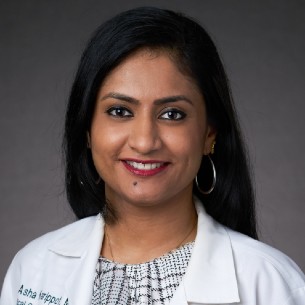 By Asha Karippot, MD
By Asha Karippot, MD
It’s Friday evening at 6 PM. I’ve just finished a packed day of seeing patients. My 8-year-old son’s piano recital is tonight, and I’m thoroughly aware that I need to leave the office now in order to make it on time. But the mound of unfinished encounter notes, lab reviews, and chemotherapy orders keep staring back at me. I know I need to get these tasks done before I can call it a day, so my patients can receive the quality and timely care that they deserve. But I also don’t want to miss my son’s recital or disappoint him by being late. This dichotomy reminds me, yet again, of the unique challenges that come with being both a physician and a mother.
As an oncologist, I often see patients with very complex cases of advanced cancer requiring careful review of the old and recent medical records, talking to the patient, completing their exam, explaining the results in a way they can understand, formulating a treatment plan, placing orders, and documenting all these activities. Moreover, these patients often have other chronic medical problems such as pain related to their cancer, anxiety or depression, poor nutritional status, diabetes, or heart disease. These patients require both medical and social services and a wide variety of providers and caregivers. Each layer of complexity in a patient’s case requires more from the oncologist to research the possibilities and make sure we’re leaving no stone unturned in their treatment options, which ultimately takes time. Every patient encounter like this requires a large amount of effort. The result is often that the job is left unfinished by the end of the day and carried over at home.
I remember a visit from a young patient with advanced colorectal cancer who had come in for a second opinion. She was disheartened with her diagnosis, previous treatments, and prognosis, and her family came to her medical oncology appointment to support her during a difficult time. During the visit she asked me the most difficult question that I encountered recently: “My family wants me to keep fighting, but I’m tired. What do I tell them?” I was certain at this point that this patient would need additional time than what was scheduled for a usual patient visit. But I was also aware of four more patients that I needed to see before attending the tumor board over my lunch hour. I made what I felt to be the most patient-centric choice and managed to fit an additional 15 minutes in her visit to better understand her and her family’s concerns and adequately answer their questions. Although this would cause more work later in the day, the happiness and satisfaction I saw on my patient’s and her family’s faces assured me that I had made the right decision.
Managing time and coping with stress is a difficult task: one that takes time to perfect. As a physician, I’ve learned that even though this balancing act isn’t naturally everyone’s cup of tea, you must learn how to do this in order to be a successful physician in today’s environment. While I’m nowhere near an expert at this balancing act, I do reserve weekends for family time, delegate work to my care team, as well as continue my work after my kids go to bed. Even with these intentional decisions I’ve made to achieve a better work-life balance, I realize I’ve experienced my 6-PM-on-a-Friday conundrum before and no doubt will again. It’s all part of the rewarding career I’ve built as an oncologist while also working to be the best parent and spouse I can be.
Dr. Karippot serves as a medical oncologist and hematologist at Cancer Treatment Centers of America (CTCA) in Tulsa, OK. Dr. Karippot is the current chair for the CTCA Tulsa Commission on Cancer Committee. She is a member of the ASCO Practice Guidelines Implementation Network. Dr. Karippot also is a member of several organizations, including the American Society of Hematology, ASCO, European Society of Medical Oncology, Society for Immunotherapy of Cancer, and North American Neuroendocrine Tumor Society.

Recent posts